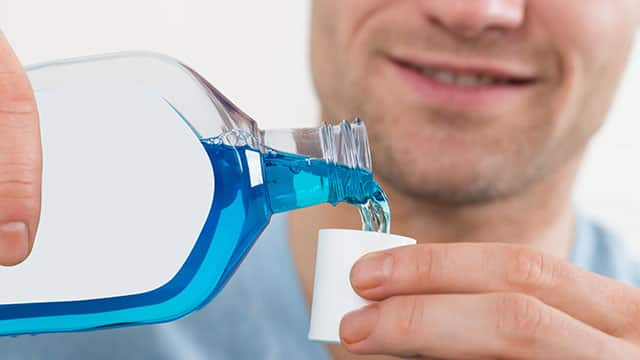What Causes Bad Breath?
As it turns out, there are a lot of common causes of bad breath—some you may have heard of (certain foods, smoking, and tobacco), and some that are a little less familiar (dry mouth, gum disease, and medical conditions).
While any one of those conditions could be a cause of your mothball breath, a significant cause of all bad breath comes down to bacteria in the mouth. Hundreds of types of harmful breath-causing bacteria live in your mouth, which is a perfect environment for bacteria to grow. Bacteria that live in the mouth can make compounds with sulfur, giving off rotten eggs or onion scent.
When it comes to other sources of bad breath, the causes are varied. If you have dry mouth, your breath odor may result from not producing enough saliva or certain medications. Bad breath from gum disease is traceable to cavity-causing plaque. Finally, your breath’s odor could also be because of a different medical condition, such as a sinus, throat or lung infection, gastric reflux, diabetes, liver or kidney disease.
Breath That Smells of Mothballs
Now that you know the common causes of bad breath, you might be asking yourself: but why does my breath smell like mothballs? While the reasons mentioned above may be causing mothball breath, another cause could arise from oral malodor, which, according to a 2016 study in the Journal of Multidisciplinary Care, is the most common form of halitosis (a term for chronic bad breath). Oral malodor is typically associated with the presence of oral-bacteria-causing sulfur compounds (which again can be stinky). These compounds could come from not brushing and flossing enough or conditions like gingivitis, periodontitis, dental cavities, and tongue coatings. As you can see, bacteria play a crucial role in the odor of your breath and could potentially be the cause of why your breath smells like mothballs.
Beyond your oral hygiene, mothball breath could also indicate that there are issues from other parts of your body. That’s because your breath has gassy compounds that move from your organs through the bloodstream into your lungs. If you think your breath could be linked to something internal, or linked to body odor, talk to your doctor to arrange a physical examination.
How to Prevent Mothball
While bad breath or a mothball breathsmell can be embarrassing, don’t worry—there are easy fixes to reduce the odor.
Brush and flossing
Make sure you’re brushing twice a day and flossing or cleaning between your teeth daily to get the bacteria-causing food particles out of your mouth.
Use mouthwash
While a temporary fix, over-the-counter therapeutic or antibacterial mouthwashes can kill bacteria and neutralize the smell of mothball breath.
Work on your saliva production
We discussed how dry mouth could be a cause of bad breath, so eating healthy foods that take a while to chew (like carrots or apples) can get more saliva circulating in your mouth. Sugar-free chewing gum can also help.
Being concerned about the scent of your breath is normal. Talking to your dentist is the first step to identifying the root cause, whether it’s your diet, saliva, or an internal issue, so schedule an appointment to discuss it. Your dentist may recommend dietary solutions or medications. If you’re concerned that your breath might signify an internal problem, set up a physical exam with your doctor, and express your concerns. Your doctor can diagnose and treat any underlying causes, and may also discuss dietary solutions or medications.
Bad breath can be outright embarrassing, but you’re not alone! Not only is bad breath (and mothball breath) common, it’s also treatable. The first step is to ensure your oral hygiene is in check, followed by opening up a discussion with your dentist. From there, you’re on your way to fresher, healthier breath.
This article is intended to promote understanding of and knowledge about general oral health topics. It is not intended to be a substitute for professional advice, diagnosis or treatment. Always seek the advice of your dentist or other qualified healthcare provider with any questions you may have regarding a medical condition or treatment.
ORAL HEALTH QUIZ
What's behind your smile?
Take our Oral Health assessment to get the most from your oral care routine
ORAL HEALTH QUIZ
What's behind your smile?
Take our Oral Health assessment to get the most from your oral care routine
Join Us
Get the best of your oral health routine and take it to the next level with expert advice, recommendations, products and solutions and special offers.
Join Us
Get the best of your oral health routine and take it to the next level with expert advice, recommendations, products and solutions and special offers.















